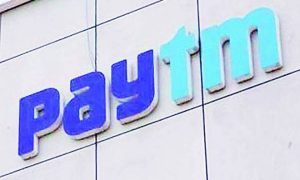One97 Communications posted a consolidated loss of Rs 1,701 crore on a revenue of Rs 2,802.4 crore for the financial year FY21 and a loss of Rs 2,942.4 crore on revenue of Rs 3,280.8 crore for FY20.
One97 Communications, the parent company of Paytm, has filed a draft red herring prospectus with the capital markets regulator Sebi to raise funds via initial public offer (IPO).
Here are 10 key things to know about the country’s largest IPO:
1) Public Issue
The company plans to raise Rs 16,600 crore through its public issue which comprises a fresh issue of Rs 8,300 crore and an offer for sale of Rs 8,300 crore by existing selling shareholders including founder Vijay Shekhar Sharma.
Investors Antfin (Netherlands) Holding BV, Alibaba.com Singapore e-Commerce Private Limited, Elevation Capital V FII Holdings, Elevation Capital V, Saif III Mauritius Company, Saif Partners India IV, SVF Panther (Cayman), and BH International Holdings will also sell their shares through the offer for sale.
The company also reserved some shares for employees.
2) Pre-IPO Placement
The company, in consultation with the merchant bankers, may consider a further issue of equity shares, including by way of a private placement of equity shares of Rs 2,000 crore, prior to the filing of the red herring prospectus with the registrar of companies.
If the pre-IPO placement is completed, the fresh issue size will be reduced to the extent of such pre-IPO placement.
3) Objects of Issue
The fresh issue proceeds will be utilised towards growing and strengthening the Paytm ecosystem. This includes acquisition and retention of consumers and merchants and providing them with greater access to technology and financial services
The offer for sale money will go to selling shareholders.
4) Company Profile
One97 Communications is India’s leading digital ecosystem for consumers and merchants, according to RedSeer. The company offers payment services, commerce and cloud services, and financial services to 33.3 crore consumers, with over 2.1 crore merchants registered with the company as of March 31, 2021. Its two-sided (consumer and merchant) ecosystem enables commerce, and provides access to financial services, by leveraging technology to improve the lives of consumers and help merchants grow their businesses.
One97 launched Paytm in 2009, as a mobile-first digital payments platform to enable cashless payments for Indians, giving them the power to make payments from their mobile phones. Starting with bill payments and mobile top-ups as the first use cases and Paytm Wallet as the first Paytm Payment Instrument, the company has built the largest payments platform in India based on the number of consumers, number of merchants, number of transactions and revenue as of March 31, 2021, according to RedSeer.
The company offers consumers a wide selection of payment options on the Paytm app, which include (i) Paytm Payment Instruments, which allow them to use digital wallets, sub-wallets, bank accounts, buy-now-pay-later and wealth management accounts and (ii) major third-party instruments, such as debit and credit cards and net banking.
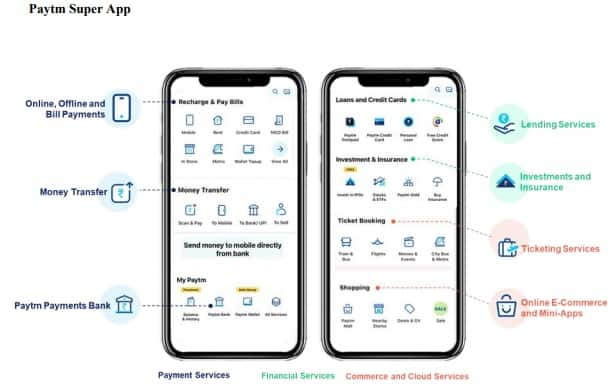
5) Competitive Strengths
a) Its ecosystem allows it to address multiple large market opportunities at scale and gives multiple growth vectors.
b) The company believes its brand stands for Trust, Convenience and Transparency. Its payments platform, with a wide selection of daily life use cases and payment instruments, provide it with a large scale and reach.
c) The company has developed unparalleled insights into the way Indian consumers spend and save, and the way merchants operate their businesses.
d) Building technology and innovating at each layer of the technology stack, allows the company to ensure that it is able to launch products and services quickly, build various features, offer integrated and synergistic products, ensure system stability, handle large scale and provide the highest success rates.
e) The company benefits from self-reinforcing network effects, which leads to low acquisition costs, higher monetization and lifetime value of consumers and merchants, and better economics across offerings.
f) Its mission and focus on solving big problems, and the expanse of its ecosystem makes it an attractive place for best-in-class leaders who bring a combination of domain expertise and a hunger to redefine the way Indians access payments, commerce, cloud and financial services products. This, combined with its culture of empowerment, helps it to grow multiple large businesses at the same time.
6) Growth Strategies
a) The company will continue to grow its consumer and merchant base, adhering to its mission which is to bring half a billion Indians into the mainstream economy.
b) It intends to expand and enhance Paytm App’s offerings for consumers.
c) The company plans to continue to expand its merchant network across cities and towns in India while also deepening partnerships with existing merchants.
d) It is focused on rapidly scaling up financial services business. It plans to continue to leverage partnership with Paytm Payments Bank to expand the suite of banking solutions for consumers and merchants.
e) The company believes there is a large opportunity to leverage technology infrastructure and expand to international markets
7) Financials
One97 Communications posted a consolidated loss of Rs 1,701 crore on revenue of Rs 2,802.4 crore for the financial year FY21 and a loss of Rs 2,942.4 crore on revenue of Rs 3,280.8 crore for FY20.
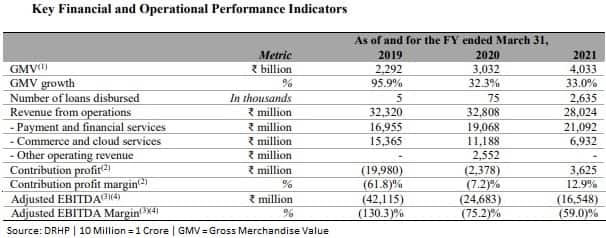
8) Principal Shareholders
The company is a professionally managed company and does not have an identifiable promoter. Currently, the company has 2,167 shareholders.
Antfin (Netherlands) Holding BV is the majority shareholder in the company with a 29.6 percent stake, followed by SVF India Holdings (Cayman) (18.3 percent), SAIF III Mauritius Company (12.1 percent), founder Vijay Shekhar Sharma (9.6 percent), Alibaba.Com Singapore E-Commerce (7.2 percent), SAIF Partners India IV (5.1 percent), and VSS Holding Trust (5 percent).
Major Shareholders
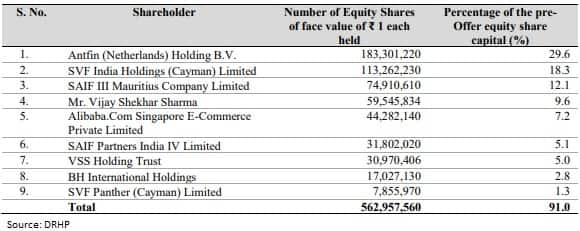
9) Management
Vijay Shekhar Sharma is the Managing Director and Chief Executive Officer of the company and the Chairman of the board. He holds a bachelor’s degree in electronics and communications from the Delhi College of Engineering. Sharma is the founder of the company and oversees the company’s key strategic efforts including engineering, design and marketing.
Douglas Feagin is the Additional Director on the board, while Munish Varma is the Non-Executive Director (Nominee of SVF), and Ravi Chandra Adusumalli is the Non-Executive Director (Nominee of SAIF and Elevation Capital, collectively).
Mark Schwartz, Pallavi Shardul Shroff, Ashit Lilani, and Neeraj Arora are Independent Directors on the board.
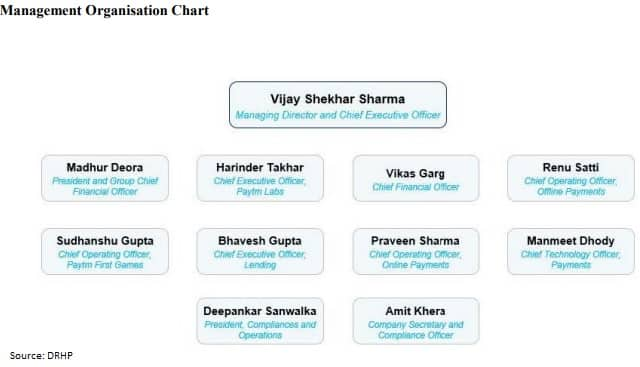
Madhur Deora is the President and Group Chief Financial Officer of the company. He holds a bachelor’s degree of science in economics from the Wharton School of the University of Pennsylvania. He was previously associated with Citigroup Global Markets India.
Manmeet Singh Dhody is the Chief Technology Officer, Payments. He holds bachelor’s degree in engineering (computer) from the University of Delhi and a master’s degree in business administration from Panjab University. He was previously associated with Amazon Development Centre India, and Microsoft India (R&D).
Vikas Garg is the Chief Financial Officer of the company. He holds a bachelor’s degree in commerce from Maharshi Dayanand University, Rohtak. He has been certified as a chartered accountant by the Institute of Chartered Accountants of India. He was previously associated with ICICI Bank, and ibibo Web.
10) Industry and Lead Managers
Digital payments have been growing steadily over time, however, India continues to be a cash-driven economy. In FY2021, the digital payments market size by value stood at approximately $20 trillion with 43 billion transactions during the year.
Digital payments are expected to more than double from $20 trillion in FY2021 to $40-50 trillion by FY2026.
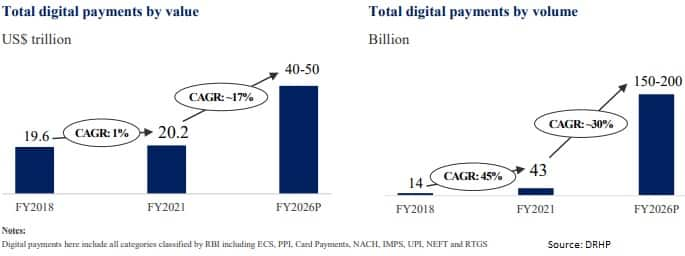
Money transfer between consumers and merchants using wallets or UPI is becoming highly ubiquitous in India and has led to a surge in mobile payments over the last few years. Mobile payments increased approximately 16 times from 1.6 billion in FY2017 to 26 billion in FY2021. Mobile payments are expected to reach around $3.1 trillion by value by FY2026
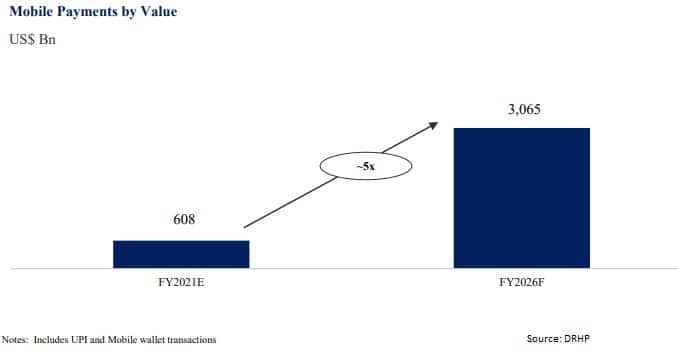

Morgan Stanley India Company, Goldman Sachs (India) Securities, and Axis Capital are the global coordinators and book running lead managers to the issue. ICICI Securities, JP Morgan India, Citigroup Global Markets India, and HDFC Bank are the book running lead managers to the issue.


